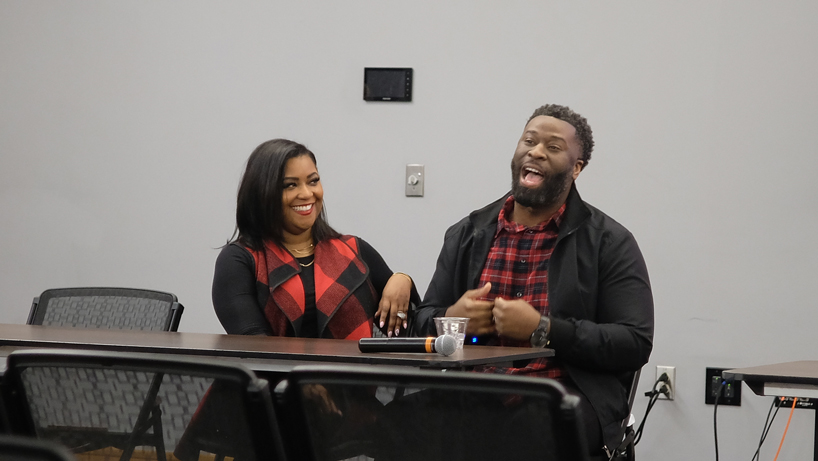
Jacob Beard answers a question as his wife, Chavon, listens Wednesday evening at the “Black Love” event sponsored by the Associated Black Collegians. The discussion, part of UMSL’s Black History Month programming, featured relationship insights from seven panelists, including the Beards. (Photo by Burk Krohe)
Associated Black Collegians kept the spirit of Valentine’s Day alive last Wednesday evening when it hosted its “Black Love” event at the University of Missouri–St. Louis.
The panel discussion, part of UMSL’s Black History Month programming, featured relationship insights from seven African American contributors. Panelists included couples Chavon and Jacob Beard and Andrew and Makeba Giles; Morgan Casey, who is in a committed relationship; and two singles, Morquise Evans and Mia Jones.
Beauty Cooper, senior philosophy major and treasurer of the Associated Black Collegians, welcomed the audience to the Millennium Student Center Century Room C for the event.
“So, what is Black love?” Cooper said. “Our objective for the panelists is to discuss romantic relationships within the Black community while covering overlapping topics of culture, career and family. We hope to launch a conversation between our guest panelists and our students.”
Tanys Giles, vice president of the Associated Black Collegians, began the event by asking the panelists what Black love meant to them.
“For me, Black love would definitely be self-love,” said Casey, owner and operator of Date Ideas & Things To Do. “The reason I say that is because I had to go through a journey of trying to figure out why my love relationships were not working. It took time for me to look in the mirror and see that it was because I was not loving myself first. Once I began to fall in love with who I am is when I started to see me showing up differently in the relationships that I was in.”
Jacob Beard – a musician, filmmaker and content creator – added that the idea of Black love is tied to the shared experience of being Black in the United States.
“I think this speaks to who we are as people,” he said. “What I mean by that is, we know what it’s like, just having the experiences that we have being Black people.”
His wife, Chavon, a medical malpractice attorney, concurred.
“That was so important to me that I found somebody who loves me unconditionally through ups and downs,” she said. “It kind of goes back to similar upbringings and how you were raised. I think that is the key role in it.”
Later on, the panelists discussed what shaped their visions of love. Makeba Giles, founder and owner of Faith Health and Home, said that she was inspired by her parents and the other marriages she saw in her family. Similarly, Evans, a student success coach, has been guided by his grandmother’s caring nature.
“She was kind to everybody,” he said. “The way that she loved everybody was inspiring.”
The panel concluded the discussion by considering what events, shifts in culture and obstacles in Black culture have impacted their view of love in the Black community.
Casey said having attended predominantly white private schools growing up, she had been a bit confused about her own culture. However, the Ferguson protests in the wake of the killing of Michael Brown caused her to reassess her identity and find a new vision of Black love.
“Being out there and actually seeing what we were really dealing with and seeing our community coming together for one purpose, to get everyone else in the world to love us, caused me to look at Black love differently,” she said. “It caused me to realize really who I am and what my Blackness means to the world as a whole.”














